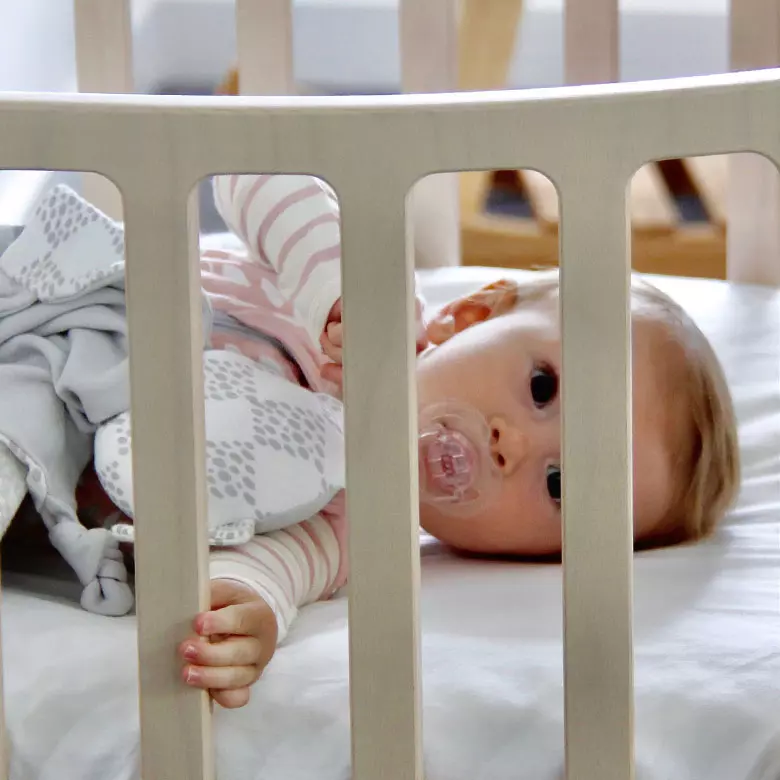Developmental milestones: When do babies roll?
Kiindred
Kiindred
Rolling is one of those lesser-talked about milestones, than say crawling, walking or talking – but when it happens it’s still just as exciting! And will quickly become their new favourite trick.
It often happens when you least expect it, your little one will be happily playing on their tummy – and boom there they go! Or often we might not even see it happen at all, one minute they’re on their tummy – we look away for a second and suddenly they’re on their back.
When do babies roll?
Like all milestones, rolling will happen at different times for all babies but typically you can expect to see some sideways movement around the 4 months mark. Some will do it earlier so it’s important to keep an eye out for signs of it. By around 6 months babies have typically mastered the roll – both the stomach to back and back again.
Why is rolling important?
Rolling is another skill that will help your baby develop the muscles they need to go on to crawl and walk. Some babies will want to show off this new skill constantly and will roll all about the place – and others will barely roll at all.
Sign up
Get tailored content based on your week of pregnancy
By signing up, you agree to receiving our Newsletters. Cancel anytime.



How to encourage your baby to roll?
Tummy time is key for your little one right from their first week. As they start to push their arms and develop muscles you will see them moving side to side and getting a feel for themselves.
Place toys over to one side or even hold them slightly behind their line of sight to get their interest and see if you can entice them to turn to see it.
When they start rolling you can put extra cushions or mats around them to make sure their head has a soft landing when they’re rolling.
How does rolling impact sleep?
Rolling can also impact sleep because your little one has learnt this fun new skill and they want to practice! So instead of drifting off to sleep easily, you may find them rolling about in their cot! Or worse they may wake up at 2 am wanting to get in some more practice.
Conversely, it might actually help them sleep better – because they’ve spent the day working so hard mastering their new skill that they are exhausted at night.
Sleep safety once baby starts rolling
Once your baby starts rolling it’s important that you take them out of a wrap or swaddle to sleep straight away and if they are still in a bassinet they should now move to a cot.
You should still put your baby down to sleep on their back, however, if they roll during the night this is ok, as long as their arms are free to help them move.
You should also remove blankets, or if you do use them make sure they are tucked firmly at the baby’s feet and cannot reach past their chest. Ideally, it’s best to switch to a safe sleeping bag that will keep the baby warm without the need for blankets.

For more tips on safe sleep and rolling check out Red Nose.
Other things to think about when baby starts to roll
When your baby starts to roll it’s time to baby-proof your house if you haven’t already. Get down on their level and think about what will grab their attention and make sure everything is safe and secure.
Rolling also means you need to be extra careful during nappy changes, to make sure they don’t try out their new skill whilst up on the table. You should never leave a baby unattended on the change table.
When should I be worried?
If your baby is not rolling this isn’t an immediate cause for concern, as some babies don’t roll and will skip this step. However, if they are not progressing past tummy time into sitting up or crawling – or at least showing signs of trying you should speak with your doctor or paediatrician.
When it comes to milestones, it’s important for parents to understand what’s normal, what’s not and when to worry. But when it comes to their development we know all babies are different and will get there in their own time.
So remember that the key is being aware of milestones – but not living by them!
Related articles:
Developmental milestones: When do babies smile?
Developmental milestones: When do babies start teething?
Simple ways to encourage your baby’s development
Related Articles
Trending
Kiindred
Follow +Brought to you by the Kiindred Editors. Our team are committed to researching and writing on all the things we know you will want to know about, at each stage of your pregnancy and parenthood journey.









